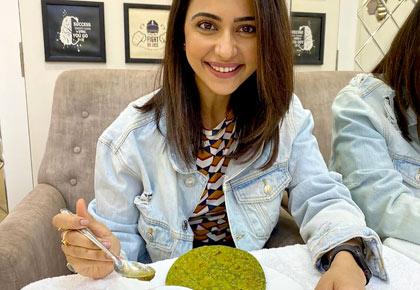Fasting doesn't mean overindulging during non-fasting hours.
Maintaining moderate portion sizes is the key to avoiding digestive issues, explains dietician Ruchi Rai.
- Health-related questions? Ask rediff Health Gurus HERE

Do you fast during Navratri?
While fasting can be an excellent opportunity to reset your body and mind, it is essential to ensure that you're nourishing yourself properly.
While many individuals observe fasts for religious reasons, others do so during this time of the year to detoxify their bodies and reduce excess calorie intake.
Many people in India avoid eating grains like rice and wheat, salt, meat and fish while fasting during the festive season.
Is fasting good for health?
It is important to plan your meals. Sudden dietary changes can have an adverse impact on both your body and mind.
It is recommended that you shift to lighter or saatvik food that is easily digestible. Maintaining a balanced diet even during fasts can support digestion, enhance energy levels and guard against illnesses.
Some tips to maintain your health and stay active through Navratri.
1. Stay hydrated
Start your day with a glass of lukewarm water and stay hydrated throughout the day.
Fresh cold-pressed juices, coconut water, herbal teas and water infused with lemon or cucumber can help maintain your electrolyte balance.
2. Consume more fruits
Fresh fruits like apples, bananas, pomegranates and papayas are great sources of vitamins, minerals and energy.
These fruits can be consumed as a quick snack or in smoothies.
3. Try dairy products
If you can't have milk, you can opt for dairy products like yogurt or buttermilk.
They provide protein, probiotics and calcium and are easily digestible.
If you are vegan or lactose intolerant, opt for dairy-free alternatives like almond or coconut yogurt.
4. Munch on nuts and seeds
Almonds, walnuts, pumpkin seeds and sunflower seeds are excellent sources of healthy fats, protein and fibre.
They take care of the hunger pangs and keep you energised through the day.
5. Potatoes and sweet potatoes
Potatoes and sweet potatoes are a staple for those who fast during Navratri; they provide a good source of energy and carbohydrates.
Just be mindful of how they are prepared. Opt for boiled or roasted potatoes over fried options.
6. Gluten-free grains
When you are fasting, you can switch to gluten-free grains like amaranth (rajgira), buckwheat (kuttu) and water chestnut flour (singhare ka atta).
They are commonly used in Navratri recipes and provide essential nutrients and energy.
7. Vegetables
Include a variety of vegetables like pumpkin, sweet potato and cucumber in your diet.
These provide vitamins, fibre and antioxidants -- exactly what your immune system needs.
8. Legumes
Some people include legumes like chickpeas and moong in their fasting diet. They are a good source of plant-based protein and fibre.
9. Herbs and spices
You can replace salt with spices like cumin, coriander, ginger and rock salt (sendha namak) to enhance the flavour of your meals.
These ingredients are suitable for fasting and have various health benefits.
10. Alternative cooking methods
Opt for dry roasting, boiling or baking instead of deep frying as these methods help retain the nutritional value of the ingredients.
How to make festive fasting more effective
- If you are fasting, you must steer clear of processed and packaged foods as they often contain additives, preservatives and excessive salt or sugar which can disrupt the purity of your diet.
- Avoid refined grains such as wheat and rice; opt, instead, for gluten-free whole grains like amaranth and buckwheat.
- To ensure a smooth fasting experience and avoid energy crashes, it's advisable to steer clear of added sugars; this includes sugary desserts, candies and sweetened beverages.
You can substitute them with honey or jaggery. - Minimise the use of excessive oil and intake of fried foods as it can make your meals heavy and challenging to digest given their high unhealthy fat content.
- When it comes to portion control, fasting doesn't mean overindulging during non-fasting hours; maintaining moderate portion sizes is the key to avoiding digestive issues.
- Avoid caffeine and alcohol to prevent dehydration and disruptions in energy levels.
- Sodas and carbonated drinks can cause bloating and discomfort; it's best to exclude them from your diet entirely.
- While rock salt is acceptable, do not overuse it; excessive salt intake can lead to water retention and elevated blood pressure.
- Lastly, be mindful of any food allergies or sensitivities you may have and avoid foods that trigger these reactions to ensure a comfortable and health-conscious fasting experience.
Fasting during Navratri can be a spiritually and physically enriching experience if done correctly.
By including a variety of nutritious foods and avoiding unhealthy choices, you can maintain your health and well-being throughout this sacred period.
Remember that fasting should be an opportunity to cleanse and rejuvenate your body, so it's essential to listen to your body's signals and make choices that align with your personal health goals.
Ruchi Rai is dietician at SRV Hospitals, Mumbai.
- Health-related questions? Ask rediff Health Gurus HERE
Disclaimer: All content and media herein is written and published online for informational purposes only. It is not a substitute for professional medical advice. It should not be relied on as your only source for advice.
Please always seek the guidance of your doctor or a qualified health professional with any questions you may have regarding your health or a medical condition. Do not ever disregard the advice of a medical professional, or delay in seeking it because of something you have read herein.
If you believe you may have a medical or mental health emergency, please call your doctor, go to the nearest hospital, or call emergency services or emergency helplines immediately. If you choose to rely on any information provided herein, you do so solely at your own risk.
Opinions expressed herein cannot necessarily provide advice to fit the exact specifics of the issues of the person requesting advice.











